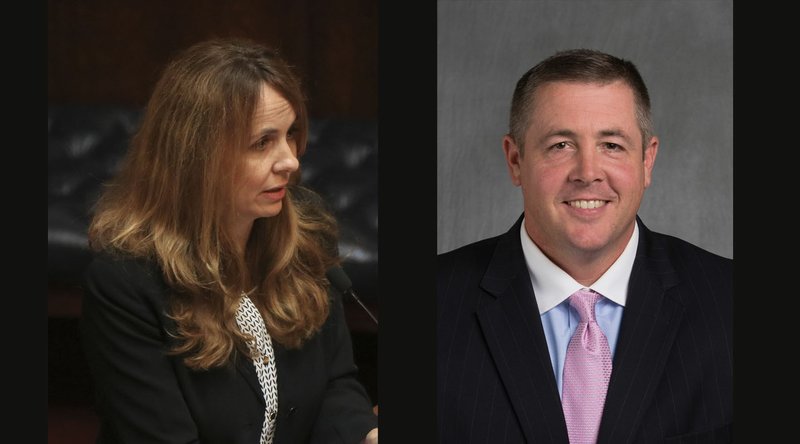A legislative panel plans to begin the first phase of a comprehensive review of the state's occupational licenses, by studying 51 licenses issued by 17 agencies, boards and commissions through August 2020.
Critics say some licensing requirements are overburdensome, protect incumbents and drive up the cost of services.
The Legislative Council's Occupational Licensing Review Subcommittee on Thursday recommended that the council, at its meeting today, adopt a six-year plan for the subcommittee to review all 307 occupational licenses issued by state entities. A portion of the total would be reviewed each year.
The subcommittee's aim is for the state to have the least restrictive form of occupational licensing while also protecting the public.
The list includes nine licenses issued by the state Board of Nursing, including for psychiatric technician nurses.
Earlier this year, Sen. John Cooper, R-Jonesboro, filed Senate Bill 165 that would have repealed licensure for psychiatric technician nurses. He said Thursday in an interview he decided not to seek approval of the bill after he learned that he had been given "erroneous information." Cooper said this isn't a preferred license and his goal will be accomplished through attrition.
Besides Arkansas, California, Colorado and Kansas also license psychiatric technician nurses and Arkansas has 66 individuals with an active license, said Sue Tedford, executive director of the Board of Nursing.
The licensed psychiatric technician nurses function in many of the same settings as licensed practical nurses and perform many of the same procedures, she said after Thursday's meeting.
Other licenses to be reviewed by the committee through August 2020 include:
• Eight licenses issued by the Department of Environmental Quality's Office of Air Quality and Asbestos Section.
• Eight licenses issued by the Department of Health's Radiation Control Section and Radiologic Technology Licensure Program and Engineering Section.
• Six licenses issued by the Fire Protection Licensing Board.
• Five licenses issued by the Motor Vehicle Commission.
• A few licenses issued by the Board of Pharmacy, Plant Board and Board of Physical Therapy.
• A license issued by the Board of Acupuncture and Related Techniques; Auctioneers Licensing Board; Professional Bail Bondsman Licensing Board; Board of Court Reporter Examiners; Department of Human Services' Office of Long Term Care; Commission on Law Enforcement Standards and Training; Arkansas State Police; and Board of Registration for Professional Soil Classifiers.
The Legislature decided this year the time had come to review how the state licenses its professions, after a national report criticized how such licensing is done in Arkansas.
The newly created subcommittee's co-chairmen are Sen. Missy Irvin, R-Mountain View, and Rep. Richard Womack, R-Arkadelphia.
Each licensing entity will make a presentation to the subcommittee and then the panel's members will make recommendations at their next meeting, Irvin said Thursday, the panel's first meeting.
"We will be able to, at the very end of this process in 2020, make final recommendations and, if there is a necessity to draft legislation, we will do so," she said. In December of each even-numbered year, the subcommittee is required to submit recommendations to the Legislative Council.
"I think this is a real opportunity for the Legislature to do some good in rolling back some onerous regulation," Womack said.
The Arlington, Va.-based Institute for Justice concluded in a November 2017 report that Arkansas ranked as "the third most broadly and erroneously licensed" state in the nation because it licenses so many occupations. For example, the state licenses several occupations such as psychiatric technicians and nursery workers who are rarely licensed by other states, the institute reported.
The subcommittee proposes to review three state Plant Board licenses, including those for nurserymen and nursery dealers, in 2025.
Earlier this year, Cooper also introduced Senate Bill 166 to eliminate the license requirement for people operating or working in a nursery. He said Thursday he didn't push the bill because he later learned the license is for nursery owners themselves, not workers. The license revenue allows the Plant Board to inspect nurseries. Having no inspections would hurt out-of-state business by in-state nurseries because of concerns about the health of their plants, he said.
The subcommittee proposes to review five licenses issued by the Department of Health's Cosmetology section in 2021, including a license for electrologists.
Earlier this year, Sen. Bob Ballinger, R-Berryville, filed Senate Bill 157 to repeal licensure for electrologists, but it died in the Senate Public Health, Welfare and Labor Committee. Ballinger could not be reached for comment by telephone on Thursday.
There are 28 licensed electrologists, said Meg Mirivel, a spokeswoman for the state Department of Health. Seventeen states don't regulate electrologists, according to Mirivel.
Metro on 06/21/2019
